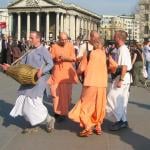
In a world often fragmented by identity, belief, and external differences, the wisdom of ancient texts offers us a timeless call: to transcend separation and rediscover unity.
The Chandogya Upanishad declares a simple yet profound truth:
“If this knowledge is imparted even to a withered tree trunk, it begins to grow branches and leaves.”
The transformative power of wisdom is such that it breathes new life even into what seems dead or forgotten. How much more, then, can it rejuvenate human hearts that yearn for meaning?
Similarly, the Ṛigveda (10.191.2–4) invites us into a grander vision of existence:
“May your resolves be similar.
May your hearts be united.
May your thoughts be similar,
So that you all may stay together happily.”
This ancient prayer for collective harmony is not a relic of the past; it is a need more urgent today than ever before. In every act of true unity, the soul of humanity finds its song again.
The Bhagavad Gita (2.19) reminds us of the fragile beauty of life:
“Our life is like a drop.”
A single drop—delicate, filled with endless possibilities. It could shine like a pearl for a fleeting moment, or it could surrender itself, merging forever with the vast ocean of Being.
The Sufi mystic Shah Kalandar echoed this spirit when he taught:
“Leave behind the names: Mulla, Brahmin, Mosque, Temple. The earth is one, the sky is one. Love and all things are one.”
We are not labels; we are the infinite witnessing itself through finite forms.
Call yourself Anahad, he said—“I am the Soundless, I am the Supreme.”
Not bound by identity, but resonating with the eternal vibration of truth.
The Vedas too affirm life’s sacred unity. They are not just books of rituals, but the Book of Life itself, divided into the poetry of the soul (ऋच्), the prose of duty (यजुः), and the songs of devotion (साम), together called Vaideetri (वैदेत्री) — the weaving of sacred knowledge into the fabric of existence.
Sufi philosopher Miya Mir, who studied the Vedas, knew that true yearning is not momentary.
“If you crave to meet the Divine, yearn for it every moment.”
Spiritual hunger, not ritual fasting, is what nourishes the soul.
Break the cup of ego.
Drink the wine of love.
Let it intoxicate you with oneness.
In spite of internal and external conflicts, the soul endures.
The science of the soul — its immortality, its vastness, its indestructible joy — is the true strength of India, and of every soul that seeks beyond boundaries.
At some point, every human heart whispers questions into the silence:
“Who am I?”
“What is the purpose of life?”
The answers are not hidden in distant heavens or rituals.
They are waiting — in the breath, in the yearning, in the drop that dares to become the ocean.

















